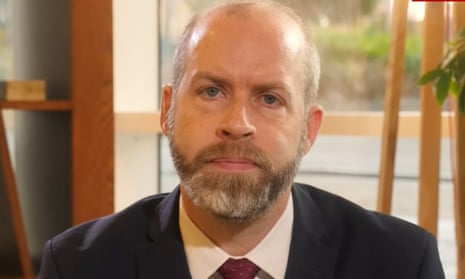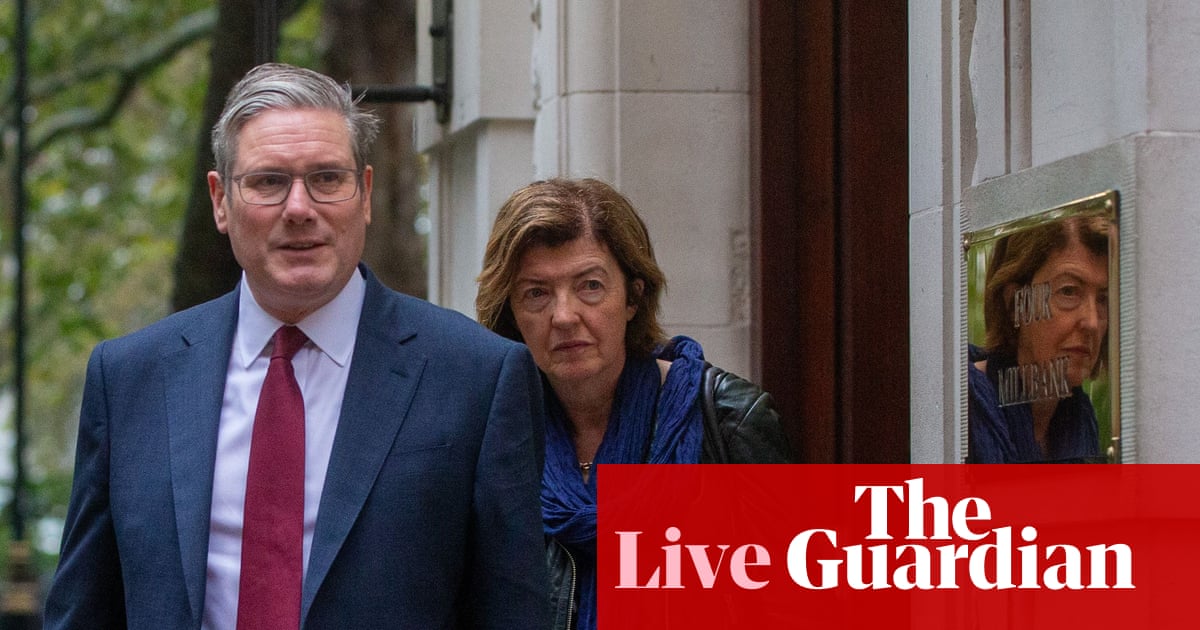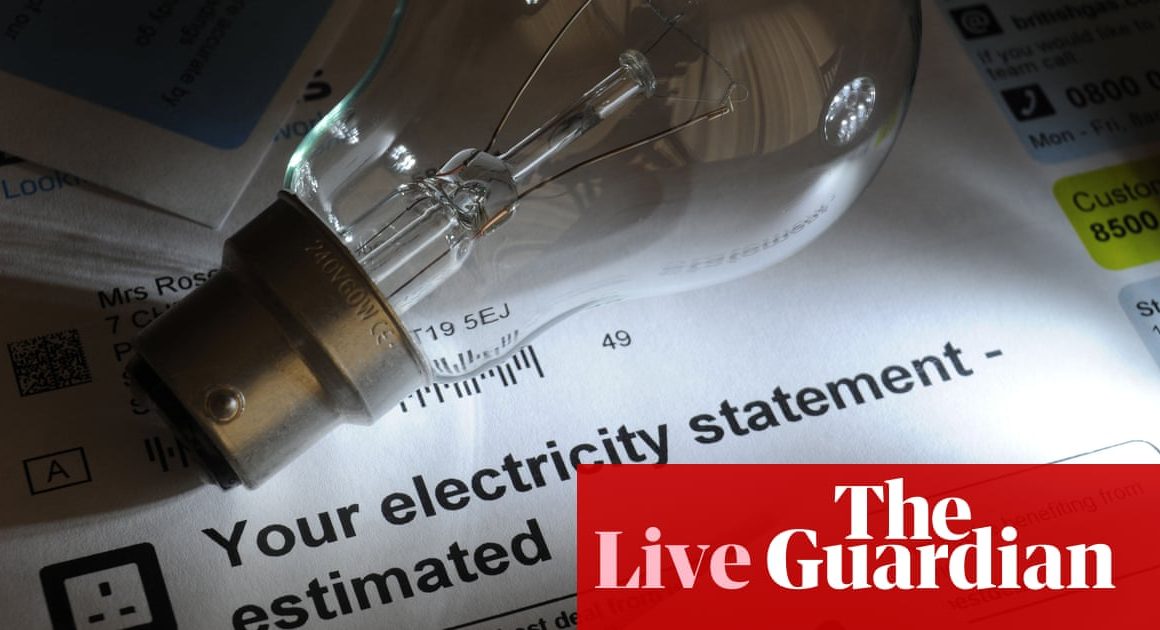Jonathan Reynolds rejects claim Sue Gray showed ‘stunning arrogance’ accepting higher salary than Keir Starmer
Good morning. Yesterday the BBC broke the story that Sue Gray, Keir Starmer’s chief of staff, is paid £170,000 a year, which is about £3,000 a year more than the PM himself. It is not a typical BBC story (more on that later), and it would be a classic prosecution exhibit for anyone arguing that political journalists are too obsessed with insider processology. There is also a strong argument that ministers and officials at the very top of politics are paid relatively little anyway if you take into account the skill set required, the hours worked, and what they might earn in the private sector.
Yes, as Chris Mason, the BBC’s political editor has argued in a blog about the story, this is more than just a slice of Whitehall trivia. That is because the story suggests serious feuding is happening within the Labour adviser machine in government. A story like this would not have ended up on the BBC without someone quite important briefing viciously against Gray, and the revelation has angered other special advisers who claim that Gray is to blame for them being offered measly salaries, at least compared to what their Tory predecessors were on, or what they were earning when they were paid by the Labour party.
So what, you might think. A few dozen special advisers most people have never heard of want to be paid more. Don’t we all? That might end up as being the appropriate response to the story. But if this row means No 10 can’t function properly because the PM’s most senior political adviser is too divisive, it will matter.
Jonathan Reynolds, the business secretary, has been doing a media round this morning, and, in an interview with Kay Burley on Sky News, he rejected her suggestion that Gray’s decision to accept more pay than the PM demonstrated her “stunning arrogance”. When this was put to him, Reynolds replied:
Clearly this an important job.
There’s a process that sets these paybands. It will reflect previous experience … It is a long-established way of establishing within certain pay bands renumeration relating to the job that you do. That’s what have been followed in this case.
The original BBC story included a quote from a source saying it was put to Gray that she might want to accept a small cut so she earned less than the PM, and that she declined. Government sources are saying that is “categorically untrue”.
Reynolds also suggested Starmer himself did not decide Gray’s pay. He said:
I think it’s important people understand that the pay bands for any official, any adviser, are not set by politicians. There’s an official process that does that. I don’t, for instance, get to set the pay for my own advisers who work directly for me. So, there’s a process, we don’t have political input into that.
The decision to increase the top salary available to special advisers in No 10, compared to what it was before the election, was taken by a committee of officials. But, according to the BBC story, Starmer signed off its decision.
When it was put to Reynolds that this was hypocritical given the fact that Starmer criticised Dominic Cummings getting a big pay rise when he was Boris Johnson’s chief adviser, Reynolds ignored this point and just replied:
There’s a process that sets these things. It is widely recognised. It’s long-standing. It hasn’t changed and that is how pay bands are set for any adviser.
There will be more on this as the morning goes on – not least because there is not much else in the diary. In fact, the main news is likely to come late afternoon. Starmer is doing a marathon series of interviews with regional TV editors (26 of them, according to Politico), but their contents are embargoed until 5pm.
If you want to contact me, please post a message below the line (BTL) or message me on social media. I can’t read all the messages BTL, but if you put “Andrew” in a message aimed at me, I am more likely to see it because I search for posts containing that word.
If you want to flag something up urgently, it is best to use social media. I’m still using X and I’ll see something addressed to @AndrewSparrow very quickly. I’m also trying Bluesky (@andrewsparrowgdn) and Threads (@andrewsparrowtheguardian).
I find it very helpful when readers point out mistakes, even minor typos (no error is too small to correct). And I find your questions very interesting too. I can’t promise to reply to them all, but I will try to reply to as many as I can, either BTL or sometimes in the blog.

Key events
As mentioned earlier, Chris Mason, who as the BBC’s political editor has the hardest job in the lobby (because everyone has a strong view on how the BBC should cover politics), has written a blog about how and why he and colleagues ending up breaking the story about Sue Gray’s salary. He says he was first told the information by a government insider on Sunday – “I had not gone looking for this information, it found me” – and that over the next two days they were able to verify and corroborate what he had been told. On why it matters, he says:
This story, at its crux, is not about [Gray’s] salary per se.
It is about the levels of upset and anger – fair or otherwise – about her and her role at the top of government.
That is what motivated the person who tipped me off – at considerable professional risk – to tell me what I am now telling you.
And I know from other conversations I have had – and members of our BBC team have had – that this person is far from alone.
And that tells you something about the fractious relationships among some at the top of government, less than three months after Labour won the election.
Reynolds defends Starmer over accepting free tickets, saying MPs need to be ‘engaged’ with cultural life
In his interviews this morning Jonathan Reynolds, the business secretary, defended Keir Starmer over his record of accepting freebies.
On Monday the Guardian reported that “Starmer has declared more free tickets and gifts than other major party leaders in recent times, with his total now topping £100,000”. Sky News has also produced its own version of this story, with figures showing how Starmer compares with other MPs who have accepted many gifts.
Referring to Starmer accepting tickets for events like football matches and concerts, Reynolds said that politicians doing jobs that involved working long hours needed some relaxation. Speaking on Times Radio, he said:
There’s always going to be the case where people in public life are invited to certain events. I can tell you having been a secretary of state for two months, pretty much every working hour of it is spent working. And if people get the chance for a little bit of relaxation as part of that, again, I’ve no problem or objection to that.
When the presenter, Aasmah Mir, put it to Reynolds that he seemed to be saying these freebies were “a perk of the job”, Reynolds argued politicians accepted tickets to events like this so they could “engage” with people.
It’s not a perk of the job, it’s part of the job. People want to engage with decision makers. They want to ask you to be aware of what they are doing. Again, I think we have the right rules on transparency in relation to that. But this is about the job that we do and the need to be engaged with the sectors that we cover.
And he made the same argument on Sky News, where he was asked specifically about Starmer accepting tickets for a Taylor Swift concert. Reynolds said:
I think these are major cultural, sporting events. I think it’s important people in public life have some connection to that, that they are aware of that. Of course, going to see Taylor Swift – I’ve never seen her myself, but I hear it’s a very significant and lovely experience to do so.
But, again, as long as those things are declared openly, transparently, in accordance with the rules, there’s no objection on my part to that.
Jonathan Reynolds rejects claim Sue Gray showed ‘stunning arrogance’ accepting higher salary than Keir Starmer
Good morning. Yesterday the BBC broke the story that Sue Gray, Keir Starmer’s chief of staff, is paid £170,000 a year, which is about £3,000 a year more than the PM himself. It is not a typical BBC story (more on that later), and it would be a classic prosecution exhibit for anyone arguing that political journalists are too obsessed with insider processology. There is also a strong argument that ministers and officials at the very top of politics are paid relatively little anyway if you take into account the skill set required, the hours worked, and what they might earn in the private sector.
Yes, as Chris Mason, the BBC’s political editor has argued in a blog about the story, this is more than just a slice of Whitehall trivia. That is because the story suggests serious feuding is happening within the Labour adviser machine in government. A story like this would not have ended up on the BBC without someone quite important briefing viciously against Gray, and the revelation has angered other special advisers who claim that Gray is to blame for them being offered measly salaries, at least compared to what their Tory predecessors were on, or what they were earning when they were paid by the Labour party.
So what, you might think. A few dozen special advisers most people have never heard of want to be paid more. Don’t we all? That might end up as being the appropriate response to the story. But if this row means No 10 can’t function properly because the PM’s most senior political adviser is too divisive, it will matter.
Jonathan Reynolds, the business secretary, has been doing a media round this morning, and, in an interview with Kay Burley on Sky News, he rejected her suggestion that Gray’s decision to accept more pay than the PM demonstrated her “stunning arrogance”. When this was put to him, Reynolds replied:
Clearly this an important job.
There’s a process that sets these paybands. It will reflect previous experience … It is a long-established way of establishing within certain pay bands renumeration relating to the job that you do. That’s what have been followed in this case.
The original BBC story included a quote from a source saying it was put to Gray that she might want to accept a small cut so she earned less than the PM, and that she declined. Government sources are saying that is “categorically untrue”.
Reynolds also suggested Starmer himself did not decide Gray’s pay. He said:
I think it’s important people understand that the pay bands for any official, any adviser, are not set by politicians. There’s an official process that does that. I don’t, for instance, get to set the pay for my own advisers who work directly for me. So, there’s a process, we don’t have political input into that.
The decision to increase the top salary available to special advisers in No 10, compared to what it was before the election, was taken by a committee of officials. But, according to the BBC story, Starmer signed off its decision.
When it was put to Reynolds that this was hypocritical given the fact that Starmer criticised Dominic Cummings getting a big pay rise when he was Boris Johnson’s chief adviser, Reynolds ignored this point and just replied:
There’s a process that sets these things. It is widely recognised. It’s long-standing. It hasn’t changed and that is how pay bands are set for any adviser.
There will be more on this as the morning goes on – not least because there is not much else in the diary. In fact, the main news is likely to come late afternoon. Starmer is doing a marathon series of interviews with regional TV editors (26 of them, according to Politico), but their contents are embargoed until 5pm.
If you want to contact me, please post a message below the line (BTL) or message me on social media. I can’t read all the messages BTL, but if you put “Andrew” in a message aimed at me, I am more likely to see it because I search for posts containing that word.
If you want to flag something up urgently, it is best to use social media. I’m still using X and I’ll see something addressed to @AndrewSparrow very quickly. I’m also trying Bluesky (@andrewsparrowgdn) and Threads (@andrewsparrowtheguardian).
I find it very helpful when readers point out mistakes, even minor typos (no error is too small to correct). And I find your questions very interesting too. I can’t promise to reply to them all, but I will try to reply to as many as I can, either BTL or sometimes in the blog.










